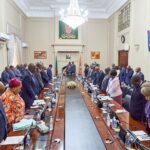Zambia’s Minister of Finance, Dr. Situmbeko Musokotwane, is facing scrutiny for allegedly contravening key legal provisions in commissioning audits of the country’s defence and security forces by private entities. The controversy stems from the hiring of private audit firms for the exercise, costing the government K16.8 million.
The Legal Framework on Defence Audits
Zambia’s Public Audit Act No. 29 of 2016 and the Public Finance Management Act No. 1 of 2018 provide strict guidelines on auditing defence and security entities. These laws emphasize the importance of safeguarding national security and outline specific conditions for audits involving external auditors. Key provisions include:
- Section 24(3) of the Public Audit Act: This restricts access by external auditors to records, premises, and documents of defence forces unless explicitly authorized.
- Section 73(3) of the Public Finance Management Act: This requires the Auditor General to obtain prior written consent from the President before granting such access to external auditors.
The purpose of these restrictions is to ensure national security is not compromised.
Allegations Against Musokotwane
Critics, including Amb. Emmanuel Mwamba, argue that the Minister’s actions violated these provisions. The Law Association of Zambia (LAZ) has also weighed in, asserting that the Auditor General’s role in appointing external auditors is limited in cases involving defence and security. LAZ further emphasized that the President’s prior consent is mandatory for such engagements.
Amb. Mwamba has stated:
“The payments and the exercise remain illegal according to the Public Audit Act as the Auditor General did not sanction the audit and did not obtain prior consent from the President as demanded by the law.”
Minister’s Justification
Despite these allegations, Dr. Musokotwane has defended his decision, citing the need for financial transparency and accountability. However, legal experts argue that no justification can override the explicit requirements of the law.
Implications of the Breach
If found in violation of the law, the government risks undermining public trust in its commitment to adhering to national security protocols and legal standards. Furthermore, the misuse of public funds for unauthorized audits could expose the Ministry to financial and reputational repercussions.
A Call for Accountability
Stakeholders, including opposition parties and civil society organizations, are calling for a review of the audit exercise and a detailed explanation from the government. The controversy highlights the delicate balance between accountability and national security, with critics urging strict adherence to Zambia’s legal frameworks.
The debate surrounding the audits of Zambia’s defence and security wings underscores the critical importance of following established legal procedures to maintain transparency without compromising national security. As the matter unfolds, the onus is on the government to address these concerns and clarify the decision-making process that led to the alleged breach.






